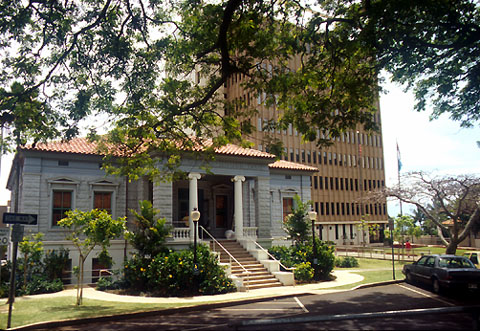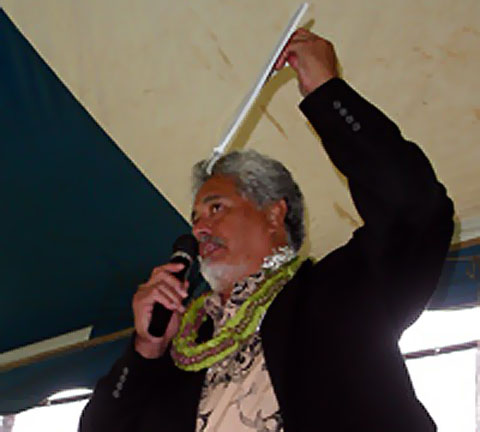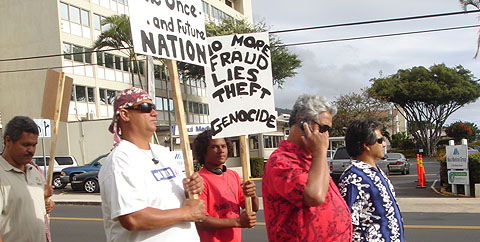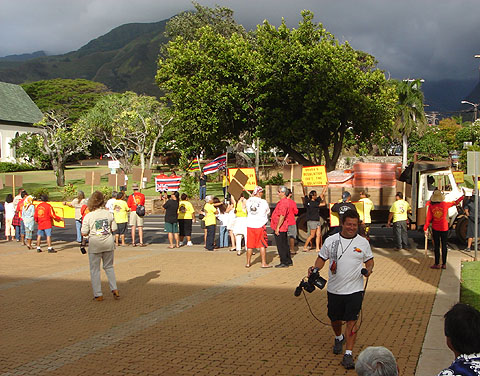Henry Noa and the Reinstated Hawaiian Kingdom
by Joan Conrow on 11 July 2007 for the Honolulu Weekly
The light went off in Henry Noa’s head on Nov. 23, 1993. That’s when President Bill Clinton signed U.S. Public Law 103-150, in which America officially apologized to native Hawaiians for illegally overthrowing the Kingdom of Hawai‘i a century earlier.
Equally compelling, the resolution acknowledged “the indigenous Hawaiian people never directly relinquished their claims to their inherent sovereignty as a people or over their national lands to the United States, either through their monarchy or through a plebiscite or referendum.”
It was the idea of enduring sovereignty that captured Noa’s attention.
“I got really enlightened,” Noa says. “If it was never given up, then where is this thing? Where is this inherent sovereignty?”
To Noa and others, the concept is simple, but profound. Since sovereignty was never relinquished, it need not be asked for, given back, granted, but instead, simply reclaimed—reinstated—essentially picked up where it left off in 1893.
It was upon that premise that the Reinstated Hawaiian Kingdom formed a provisional government in March 1999. Since then, supporters have been working to establish the Kingdom’s authority to be recognized as the lawful government of Hawai‘i. They drafted citizenship rules, registered voters and held two elections, in which Noa was twice named prime minister. They also adopted laws and the amended Hawaiian Constitution of 2000, an updated version of the
one in effect when the constitutional monarchy was overthrown.
“Our former nation was well documented,” Noa says. “It’s not something we made up.”
Now Noa and two other Kingdom citizens—Nelson Armitage Sr. and Russell Kaho‘okele—are putting both the Kingdom’s founding premise and its political legitimacy to the test. In a hearing set for July 27 in Maui District Court, the three men will face charges of trespassing and entering a restricted area for landing on Kaho‘olawe July 31, planting a Hawaiian flag and claiming the island for the Kingdom.
“Under international law, when a nation returns, it has the right to reclaim what the government rightfully possessed,” Noa says. “If you read our website ([www.hawaii-gov.net]), you’ll see a continual progression toward establishing a governmental process. We understood that if we were going to come forward and make claims, such as we have the right to reclaim political authority in Hawai‘i, we would need to substantiate that claim.
“It took years,” Noa continues. “This is why we feel when we did the action of reclaiming Kaho‘olawe, it was based on the fact that we have fulfilled our obligation as a government to establish [that] we can come forward and exercise that right. All these years I waited so patiently to fulfill our obligation to qualify to reclaim.”
When the Kingdom decided it was ready to exercise its right of reclamation, Kaho‘olawe seemed a natural place to start. The former military bombing target has no permanent occupants or “third party” landowners to complicate legal issues. It is also the one piece of land in the Islands specifically earmarked for return to a Hawaiian sovereign entity, and it is being held in trust by the state until that occurs.
“When we sat down, we realized Kaho‘olawe is where it would begin,” Noa says. “We are that sovereign entity.”
The flag planting wasn’t a publicity stunt, but it was done deliberately, and with authorization from the Kingdom’s legislative assembly, specifically to push a point, Noa says. Again, the Kingdom’s strategy is based on simple logic. If it never gave up Kaho‘olawe—or any of the lands under its control at the time of the overthrow—how can it be possible for Kingdom nationals to trespass there?
“I didn’t want it to go to court,” says Noa, who with Armitage and Kaho‘okele was released on $100 bond “after we assured them that we are not fleeing our country.”
“I wanted them to respect who we are, that we’re the rightful owners of Kaho‘olawe. But they disagree, which is why we’re in their courtroom. Our strategy is just to state who we are, that we represent that sovereign Hawaiian entity and Kaho‘olawe belongs to our sovereign nation. It’s pretty straightforward. There’s no trick up our sleeve.”
The case was originally set for June 15, and Kingdom advocates were ready, staging a rally and march outside the Wailuku courthouse that drew about 100 supporters from all islands. But that morning, the defendants and their attorney, Dan Hempey of Kaua‘i, were informed the hearing would be continued.
“I was kind of caught off guard,” Noa says, “but we’re gearing up to do it again on July 27th.”
Noa refuses to speculate on the outcome of the hearing, saying only, “It’s going to be a day in court. I am not a prophet.”
If the judge decides for them, “that would be exciting,” he says. “It would send a clear message that we have this right and we have in fact fulfilled the obligation under international law to reclaim our right.”
If they’re found guilty, “we’ll appeal. We believe we’re right in our course of action.”
Appeals, however, can drag on, and the current question facing the Kingdom is whether it should start reclaiming more land now, or wait until the Kaho‘olawe case is pau.
“We’ve been 114 years trying to correct the injustice that was done, and a lot of kanaka maoli are anxious to get more activities going, get more done,” Noa says. “We have our conventions and discuss what should be done. The legislative assembly will decide. We’re not running a dictatorship here.”
The assembly did agree to keep the office of monarch, in a ceremonial role similar to the British crown. “That was one of the hottest topics of discussion,” Noa says, and the consensus was to make it an elected position. “In the process of constructing the government, that will be an exciting election.”
Noa, born and mostly raised on a Hawaiian Homestead in Waimanalo, didn’t think much about sovereignty until he graduated St. Louis High School and enrolled in the University of Hawai‘i on a football scholarship, during the Hawaiian
Renaissance period of the early 1970s.
As he earned a degree in physical education and social studies, Noa attended courses taught by professors who taught him a different version of Hawaiian history, one that included details about America’s illegal involvement in an overthrow plotted by wealthy sugar planters and carried out with the help of U.S. Marines.
Those revelations piqued his interest in sovereignty, and Noa began studying international law as a hobby while pursuing a teaching career, getting married and raising nine children. “It was through that research that I ended up discovering a former recognized nation has certain rights, despite the illegal overthrow. I realized a lot of our Hawaiian people never understood the principles of international law and how it could be used to reinstate our nation.”
Noa came to believe that the emerging models for sovereignty were intrinsically flawed, “like trying to dribble one football,” because they failed to address that “we have this inherent right to exercise once we understand how to fulfill it.”
The Apology Bill served as a catalyst, pushing Noa and others in 1996 to form the group Kaona, which was dedicated to informing Hawaiians about the reinstatement concept. Kaona and its educational efforts galvanized a grassroots movement that spanned the Island chain and ultimately brought people together to participate in a legislative assembly that created a provisional government.
Politically, the Reinstated Hawaiian Kingdom was founded on the premise that civilized nations operate under the rule of law. “The fundamental principle of law is the right of a nation to exist, and this right extends beyond being in control and being in power,” Noa says. “If a nation is overthrown, then its own sovereign could preserve that right forever, and this could be done through a simple protest or objection to the action being undertaken.”
And Queen Lili‘uokalani did, indeed, object to the overthrow, drafting a protest letter to the American government on the very day she was removed from her throne and imprisoned at ‘Iolani Palace.
“The interesting part about international law is it was actually established knowing larger nations would have the desire to conquer other nations,” Noa says. “It’s flexible enough to have that occur, but at the same time, protect the smaller nation. It took me a long time to catch on to that and really understand it. Then it came to, how do you execute it? Because one of the most difficult things about international law is enforcement.”
That reality, coupled with the intrinsic spirituality of Hawaiian culture, explains why the Reinstated Hawaiian Kingdom movement has such a strong spiritual component. In many respects, its followers are engaged in a supreme act of faith, adhering to a belief system that maintains that justice does prevail, wrongs are set right and the truth will set you free.
“To me, it’s about keeping the faith,” Noa says. “We have the right, and to not exercise it is the greatest sin. Eventually, I believe, Akua will grace us, and I keep praying that grace will come.”
In many ways, Noa says, it’s a miracle the Kingdom has come this far. Early on, supporters agreed to “cut the umbilical cord” with the state and federal governments. The decision was designed to “teach ourselves what it means to be independent,” he says, but it also eliminated access to many funding sources available to nonprofit organizations and groups holding a business license.
Supporters raise money for the Kingdom by making and selling laulau, hulihuli chicken, kalua pig and smoked meat, and they’re constantly looking for ways to “streamline what we need and just focus on the necessities,” he says. They also donate their own time and money.
Faced with the cost of running another Island-wide election, Kingdom supporters sometimes wonder if they backed themselves into a corner by refusing to seek government funding. But Noa says, “We’ve gotten this far, why should we turn back now? It’s a matter of pride, dignity, and it has actually strengthened the people involved with reinstatement.
“Nobody really gets paid in this process,” adds Noa, who with his wife’s blessing left teaching several years ago to devote himself fulltime to the Kingdom. “It has definitely been a struggle as far as surviving family-wise. I’m really happy she’s supportive. She’s a wonderful woman.”
Despite the personal challenges he’s faced, Noa says he’s thankful for “all of those who have been a part of reinstatement, who have stuck with it and been dedicated. Sovereignty is such a fascinating life. You know you have this right, but at the same time, you have to convince other nations you have this right.”
Noa sometimes becomes frustrated and discouraged with the process, and initially he was angry at both the injustice of the overthrow and the difficulties encountered by those trying to resolve the issue. But he says he trained himself not to succumb to those emotions.
“Dealing with people constantly made me realize I’ve gotta be positive. I have to, so I can transmit that energy to others. That’s the only way you can preserve your sanity,” he says. “And trying to preserve your sanity is the most difficult thing in building a nation.”
It hasn’t been easy finding legal help, either. Although Hempey is representing the Kingdom on the Kaho‘olawe trespassing charges, Noa says there’s a shortage of attorneys sufficiently familiar with international law to help the Kingdom press its claims in the World Court.
“There is no living that can be made restoring nations to their independence,” he says with a laugh. “This issue doesn’t come around too often.”
Still, he does find cause for hope, noting that more than 40 nations were restored to independence in the 1990s. He also looks to Israel, which he says struggled for 1,848 years to reclaim its sovereignty, as a model for achieving the Reinstated Hawaiian Kingdom’s goals.
“It has been hard work, a lot of work, and I don’t see it diminishing,” Noa says. “We’re about trying to fulfill our responsibility, our duty, and it ain’t gonna come easy. But I can see the tunnel, and there is a light at the end of it. You may not be able to see the light, but in my heart I know it’s there.”
No. 07-0068 - A RESOLUTION.
The Kanaka Bill.
To Provide the Alternative to the Akaka Bill.
WHEREAS, the Hawaiian people possess an inherent right to reclaim the former Hawaiian Nation's absolute right to political authority (a government to represent he Hawaiian people) and the perfect right to reclaim lands that belong to the former Hawaiian Government;
WHEREAS, this inherent right continue to exist because:
1) The former Hawaiian Nation was recognized as an independent sovereign nation;
2) Our Queen Lili'uokalani had objected and protested the unlawful overthrow of the constitutional government and nation;
3) The Hawaiian people have not given up their inherent right either through a plebiscite or referendum. These principles of international law acknowledge the continued existence of the Hawaiian peoples' inherent right to reclaim their nation, government and lands;
WHEREAS, On March 13, 1999, Na Kanaka Maoli initiated a sovereignty process to reinstate the former Hawaiian Nation's right to political authority without the aide or interference of the United States government, State of Hawaii government, City & County governments, or any of their corporate state agencies such as OHA (Office of Hawaiian Affairs).
A government was formed to facilitate the required protocol under international law to qualify a [Hawaiian] nation for recognition;
WHEREAS, to insure the preservation of the Hawaiian people's inherent right to reinstate an independent sovereign nation, the reinstated Hawaiian government shall conduct an election to fill the government offices of the House of Nobles, the House of Representatives and the executive Office of Prime Minister;
WHEREAS, all Kanaka Maoli possess an inherent right to this process and shall all be qualified to participate in this election.
Be it enacted by the Legislature of Hawai'i,
Section 1. That a registration process shall be implemented to identify the Kanaka Maoli to place unto an election roll.
Section 2. That the election shall be conducted in the year 2007. The day of election to be confirmed before June 30, 2007. The date of election to be selected between August 31 and Nov. 26 2007.
Section 3. That following the election all elected Officials shall convene at a designated site to be sworn in as officers of the Hawaiian Government on January 17, 2008.
Section 4. That immediately following the swearing into office of all the elected officials the legislature shall convene to conduct government matters.
Section 5. That the newly elected government officials shall discuss a Constitutional Convention (to set an official date, time, and place).
Section 6. That the newly elected government officials shall convene to pass or deny laws for the Hawaiian nation.
Section 7. That this resolution shall be in effect until March 1, 2008. Review for amending shall be pursuant to Article IV of the Constitution.
Approved this 20th day of January, A.D. 2007. Signed by the Prime Minister of Hawai'i.
|
|



